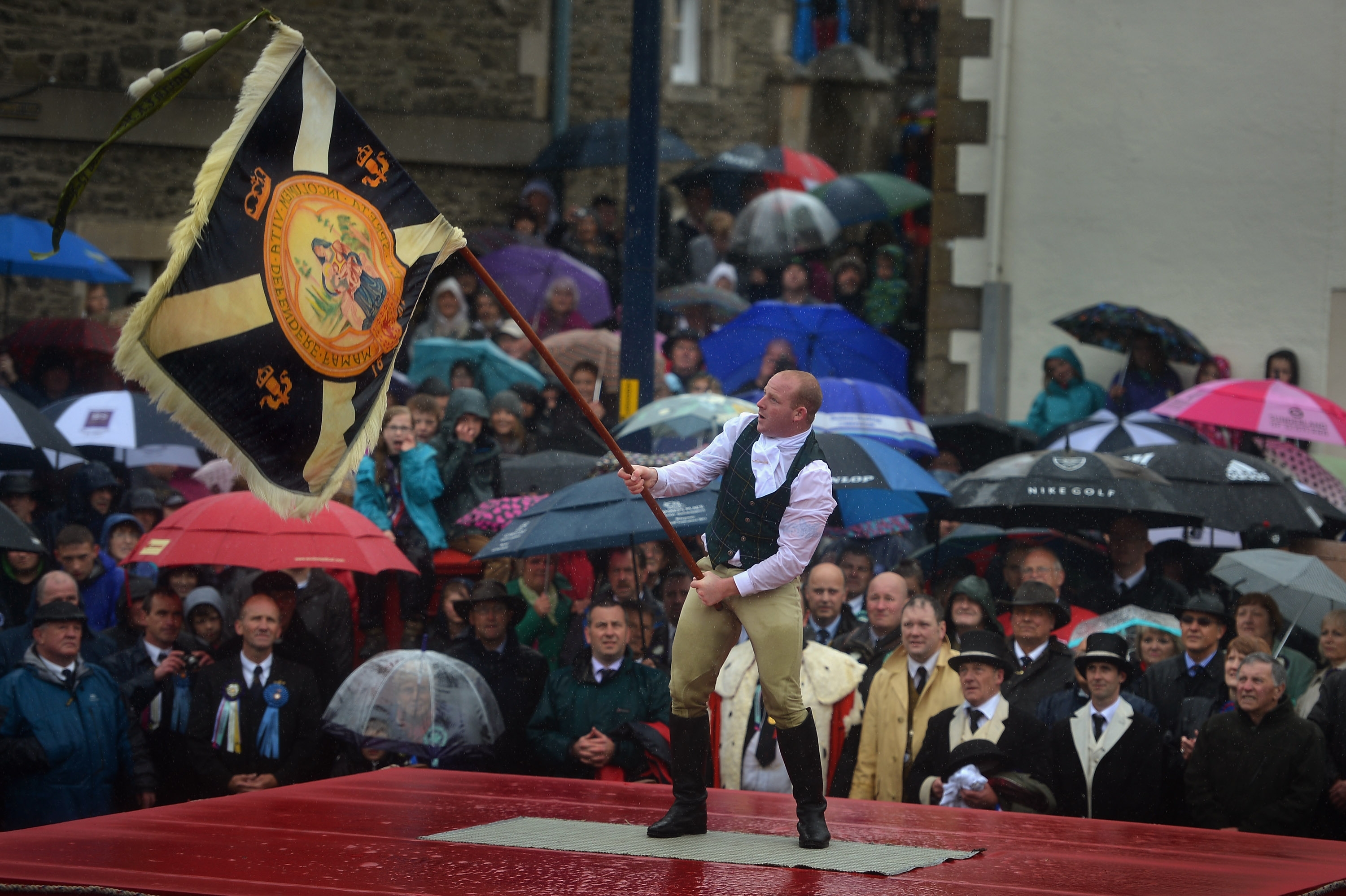It is Selkirk Common Riding today. The biggest, most important, day in my home town’s year. A day lent extra significance in 2013 since this is the 500th anniversary of the catastrophe at Flodden Field, a battle still recalled in these parts with a mixture of pride and melancholy. If you listen with due attention you can still hear the hoofbeats of history here.
King James IV was the last British monarch killed in battle. As many as 10,000 of his compatriots fell with him that bleak September day in Northumberland. Among them were a handful bishops and many sons of the aristocracy. Scarcely a family in the country was untouched by grief. And few places, so the legends have it, suffered more grievously than the Royal and Ancient Burgh of Selkirk. At least 50 and perhaps as many as 80 men from Selkirk and the Ettrick Forest rallied to King James’s call.
Only one, a man named Fletcher, returned alive. He bore with him an English standard, picked up amidst the tumult, that, upon returning to Selkirk, he waved – or ‘cast’ – around his head before lowering it to the ground in silent, mournful tribute to the fallen and to the catastrophe that had swamped Scotland and Selkirk.
Or so the story goes. That moment – Fletcher’s return – is commemorated and re-enacted on the second Friday after the first Monday in June each year. The “Casting of the Colours” is an elaborate and always poignant moment. Standing upon a stage constructed in the burgh market-place beneath a statute of Sir Walter Scott (for many years Sheriff of Selkirkshire), the town’s Standard Bearer – a young man, single and of good repute – casts the town flag as the town Silver Band plays the town song, “The Souters of Selkirk”. He is followed by representatives of the still-extant medieval guilds: the Weavers, the Fleshers, the Hammermen and then the Merchant Company and the Colonial Society (comprised of Selkirk Exiles) and, last, the Ex-Soldier’s Association.
This final casting is followed by a two minute silence interrupted only by the strains of The Flowers of the Forest. This lament, familiar from more than a hundred thousand funerals around the world, is an ancient air associated with Selkirk and Flodden since time immemorial. In 1756 Jean Elliot wrote the words, commemorating Flodden-spawned grief:
I’ve heard the lilting, at the yowe-milking,
Lassies a-lilting before dawn o’ day;
But now they are moaning on ilka green loaning;
“The Flowers of the Forest are a’ wede away”.
[ …]Dool and wae for the order sent oor lads tae the Border!
The English for ance, by guile wan the day,
The Flooers o’ the Forest, that fought aye the foremost,
The pride o’ oor land lie cauld in the clay.
Though Flodden, especially this year, is always present the Common Riding predates the battle by several centuries. For seven hundred years or more Selkirk folk have ridden the marches of the town’s common land to inspect the boundaries and make sure neighbouring landowners have not encroached upon the burgh’s prerogatives. Every town in the Borderland celebrates a festival week but only Selkirk, Hawick, Lauder and Langholm still ride the ancient marches (see this useful BBC guide for more). It is believed that these are the largest mounted cavalcades in europe. If they are not quite so dramatic as the Border Reiving days when, it is said, an Armstrong or Scott could put more than a 1,000 men into the saddle at next to no notice they remain quite something. They are some of the things that knit this part of the world together and, though visitors are welcome, they are no kind of tourist event. They are a show, for sure, but not a show put on to impress outsiders.
Selkirk, of course, is not the only town to commemorate its past. Your own doubtless does too. I mention Selkirk because I know it and because these events have an importance beyond mere pageant or tradition. They are part of the ties that bind us to our pasts. This year’s Standard Bearer, Martin Rodgerson, 28, was at least the third-generation of Rodgerson men to bear the burgh banner, returning it to the Provost in the same condition he accepted it this morning: “Unsullied and untarnished”.
A century ago, on the 400th anniversary of Flodden, Selkirk raised funds for a “fitting memorial” to the battle. The subscription was so successful that a surplus was recorded, leading the burgh’s officers to find ways to spend it. They decided to invite Lord Rosebery to unveil the monument and, as a bribe, offered him the carrot of being granted the Freedom of Selkirk. He accepted.
I must say that this is an indication of how times have changed. On this, the 500th anniversary of Flodden, I do not believe it occurred to anyone to think to invite a recently departed Prime Minister such as John Major or Tony Blair to come to Selkirk. Nor, had they been so invited, can one imagine them accepting the honour bestowed upon them. And had they been invited and had they accepted I doubt they would have said, as Rosebery said in 1913, that:
[T]oday, Mr Provost, our business is with the battle of Flodden. We have to throw ourselves back four centuries and try and place ourselves in the position of the men of Selkirk that day. I do not think it is necessary for me today to go in detail into the history of the battle. It is in reality familiar to every man, woman and child. It is the disaster that has sunk deepest into the Scottish heart, and has caused the longest and most open wound.
Despite that, Rosebery delivered a long and learned speech plainly built upon his own reading of a breadth and depth and sensitivity it is impossible to imagine being matched by any of our present ministers. As for Fletcher? Rosebery put it well:
And now, gentlemen, there is that other legend to which I must briefly allude – but dancing with extreme delicacy among controversial eggshells – (laughter) – the legend of your one solitary survivor. What is the use of analysing a tradition of which we are all proud? (Cheers)
Indeed. But given what we know came soon after it is sobering to read of Rosebery declaring in 1913:
Nations have but little control over the wars they wage. At this moment all over europe you see nations armed to the teeth, which at a moment’s notice, at a flash across the telegraph wire, might find themselves involved in battles compared to which even the battle of Flodden was child’s play, wars carried on on earth and under the earth, on the sea, over the sea, and under the sea, and even in the blessed firmament of Heaven; wars that would involve not merely the death of your nobles and leaders and of great masses of your countrymen, but the very existence of the State itself. Let us at least then in this sober twentieth century, when we’re perhaps not so fond of fighting for its own sake as in the days of the Border men, 400 years ago, when we can better reason on the chances and the liabilities and the catastrophe of war, let us at least take this lesson to heart, to be vigilant as to the wars in which we may engage, and hold our statesmen responsible for their share in them.
Rosebery, of course, was a Unionist to his bootstraps and so, naturally, was his audience. The great revivals of interest in Wallace – anointed Guardian of Scotland in Selkirk – and Bruce were still-recent things but few folk thought there any contradiction between Scottishness and Britishness. So Rosebery concluded his remarks (the first of three speeches he gave that day) thus:
And so, like the Scottish knights in 1513, we still rally round James IV at Flodden, and while we deplore the slaughter, we pray that Scotland may remain worthy of their high example, and that she may bear in her proud bosom sons and heroes worthy of that glorious and tragic tradition. (Loud cheers)
At the conclusion of Lord Rosebery’s remarks the record tells us that “The audience, upstanding, then joined in the singing of the ‘Flowers o’ the Forest’.”
So, yes, all this was of another age. But there are things we can learn from our ancestors. Those were the days of muscular municipal confidence. There was no need for Prime Ministers to talk about woolly concepts such as the “Big Society” for such a thing was taken for granted. That scarcely means everything – or everyone – bloomed in days of yore but looking back now it is hard to avoid envying the swagger our small towns exhibited a century ago. These were places that, whatever their shortcomings, at least possessed a keen sense of their own worth.
Perhaps they wanted for much but they made their own fortune too. Today these towns – and countless others like them across the United Kingdom – are diminished creatures. Their common lands have been usurped, their Common Good funds thieved by local authorities, their Town Councils stripped of all or any authority. And to what end? Precious little.
Once upon a time David Cameron talked about the importance of his “localism” agenda. That was in the sunlit days of opposition, of course, and that sun set long ago. Nevertheless, local platoons and small affiliations remain more powerful than their larger brethren. It remains a considerable shame that Cameron has done little to devolve power and responsibility to the people themselves.
Not every town is blessed with a history as rich as Selkirk’s but many places in Britain have much of which to be proud. Many too retain the ‘social capital’ to do much more for themselves – much more and much better to boot – than is presently permitted. Sometimes, you see, listening to history can set you soaring. The people are bigger and better than officialdom allows or believes them to be.








Comments